#Mohenjo-Daro
Explore tagged Tumblr posts
Photo

A Gallery of the Indus Valley Civilization
The Indus Valley Civilization (c. 7000-c. 600 BCE) is among the oldest in the world but, as it was only “discovered” in 1829 – after ancient Egyptian and Mesopotamian sites had already been excavated – many of the “firsts” of civilization were attributed to these cultures while, today, scholars believe they should be credited to the region of modern-day India.
Little is known of the Indus Valley Civilization (also known as the Harappan Civilization and the Indus-Sarasvati Civilization) because, unlike Egyptian hieroglyphics or Mesopotamian cuneiform, the Indus Script (also known as Harappan Script) has not yet been deciphered. All that is known of the culture comes from physical artifacts found at sites such as the ruins of the cities of Harappa and Mohenjo-daro.
This gallery presents some of the best-known sites and artifacts excavated to date along with maps of the region based on the chronology suggested by these finds and their location. At the height of the Indus Valley Civilization, Harappa and Mohenjo-daro are thought to have had populations numbering between 40,000-50,000 but little is known of their daily lives today other than what is suggested by their art and architecture.
Continue reading...
73 notes
·
View notes
Text
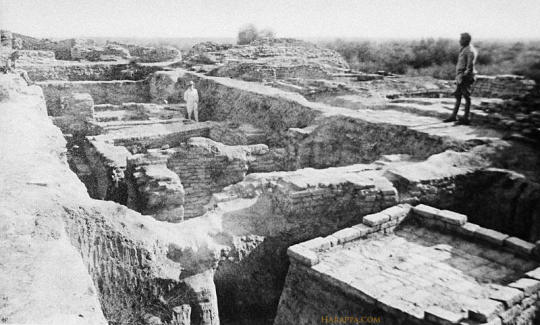
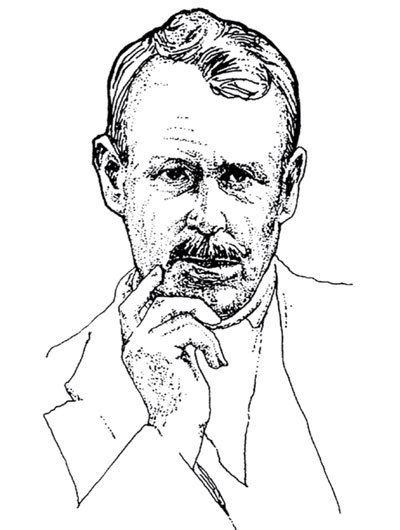
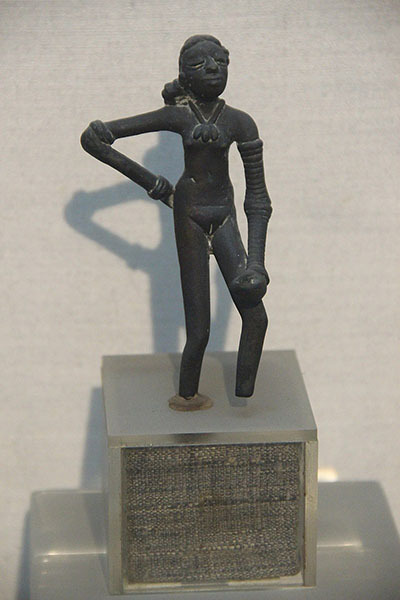
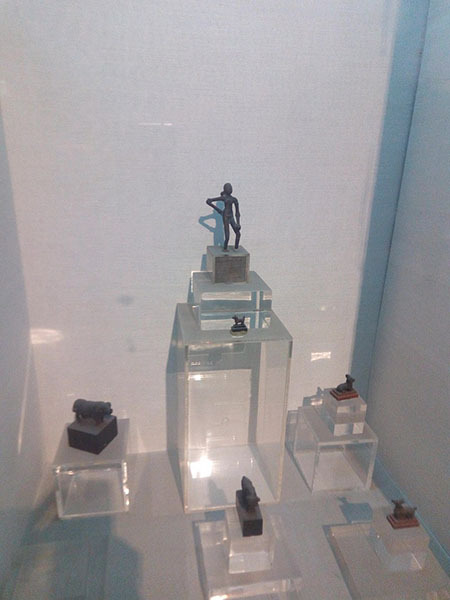
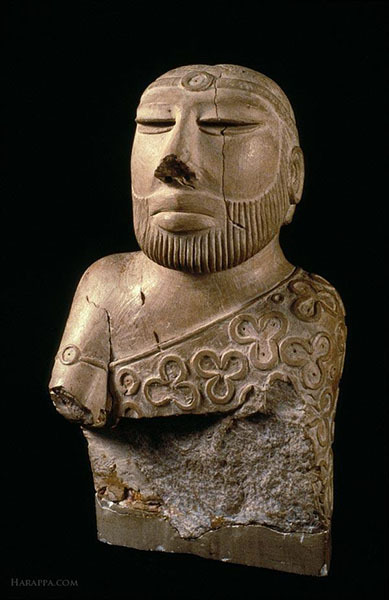
Ernest Mackay – Scientist of the Day
Ernest John Henry Mackay, an English archaeologist, died Oct. 2, 1943, at age 63.
read more...
#Ernest Mackay#archaeology#Mohenjo-Daro#Dancing Girl#histsci#histSTM#20th century#history of science#Ashworth#Scientist of the Day
18 notes
·
View notes
Text
I am Death, the Destroyer of Worlds, bringing death to all living things: Chronicles of a prehistoric nuclear apocalypse
A few people doubt that at the turn of the XXV-XXX millennia BC, a war with the use of nuclear weapons raged on our planet. This is confirmed both in the ancient Indian texts "Ramayana" and "Mahabharata", and scars in the form of funnels from explosions of nuclear warheads on the surface of the Earth.
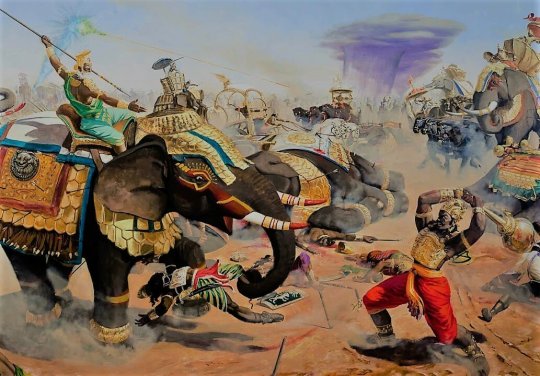
There are more than a hundred craters with a diameter of 2 to 3 kilometers, whose age is 25-35 thousand years, as well as two huge craters, the age of which also fits into this time interval.
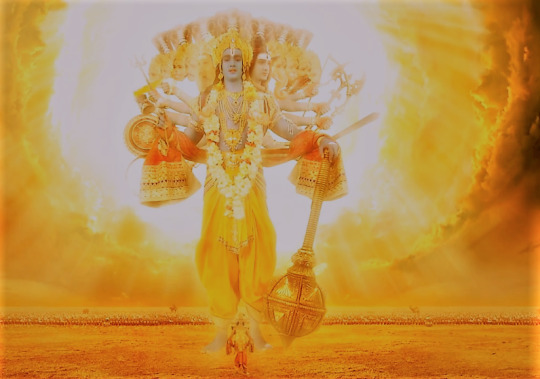
The first is located in South America and its diameter is 40 kilometers, the second is found in South Africa with a diameter of 120 kilometers. One of the largest battles of that war with the use of nuclear weapons took place in the territories of today's India and Pakistan.
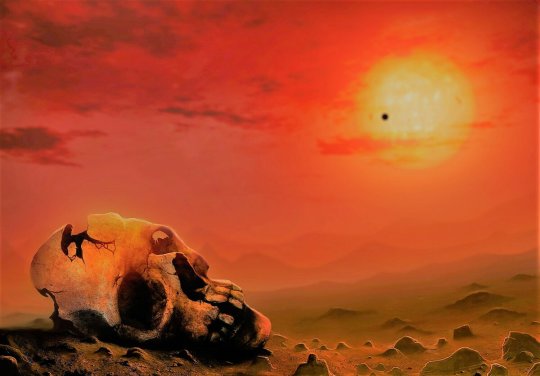
Then this was part of the Rama empire. As a result of archaeological excavations at the site of the capital of the vanished empire, Mohenjo-Daro, human skeletons were found with traces of radioactive damage and sand baked to glass, exactly like that found in modern nuclear test sites.
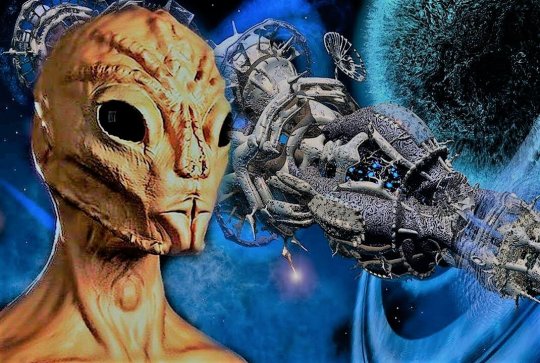
There are two versions of the nuclear apocalypse that happened in the Earth's past. In the first case, the Asuras and reptilians, aliens from outer space, fought. Asuras lost the war and tried to hide in their underground shelters.
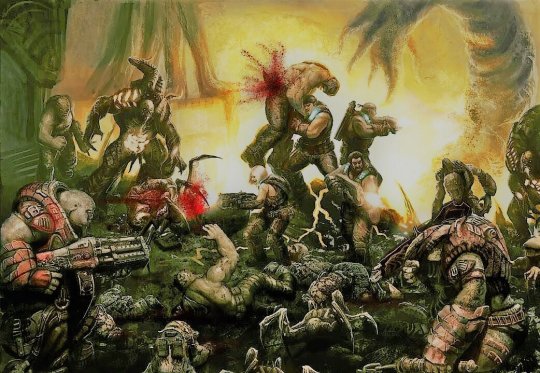
However, earthquakes and floods caused by a nuclear cataclysm on a planetary scale destroyed their underground cities and forced them to rise to the surface again. There, the invaders who colonized the Earth were already waiting for them, and the Asura race practically ceased to exist.
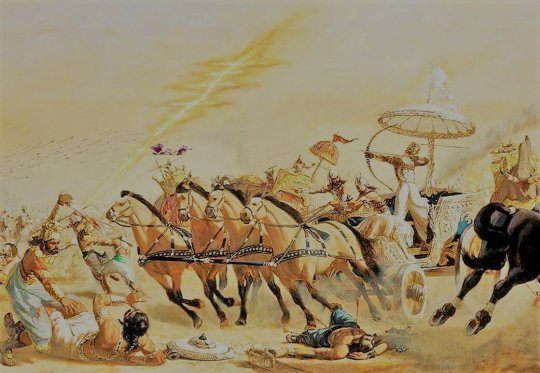
In the second case, the conflict allegedly took place between the Atlanteans (Aswins) and the Lemurians, representatives of the Rama empire. As a result of nuclear bombardments by the Atlanteans, which they carried out from their aircraft - vimanas, the Rama empire was almost completely wiped off the face of the Earth.

This is how it is described in the Mahabharata epic: “In all its splendor, red-hot columns of smoke rose and flames brighter than ten thousand suns ... the corpses burned beyond recognition. The survivors lost their nails and hair. The birds are gray. All food became unusable. The soldiers who escaped the fire rushed into the water to wash away the ashes ... ".
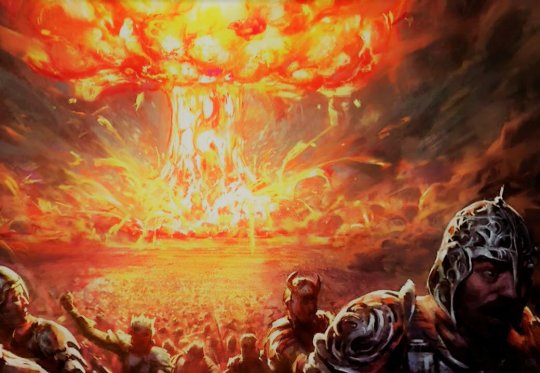
On the face are all signs of radiation sickness in survivors and radiation contamination of animals and food. Given that the surviving soldiers rushed to wash off the radioactive ash, the Lemurians were well aware of the concept of "radiation". Also, do not forget that traces of nuclear bombings were found on different continents of our planet.
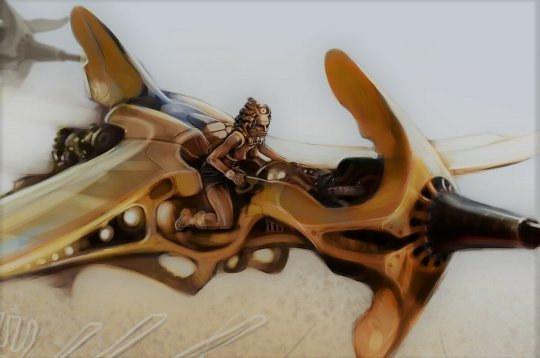
This is explained quite simply. The Lemurians also had their own air fleet, consisting of vimanas. It can also be assumed that they also possessed nuclear weapons and nothing could prevent them from using it on the territory of the Atlantean empire as a weapon of retaliation.
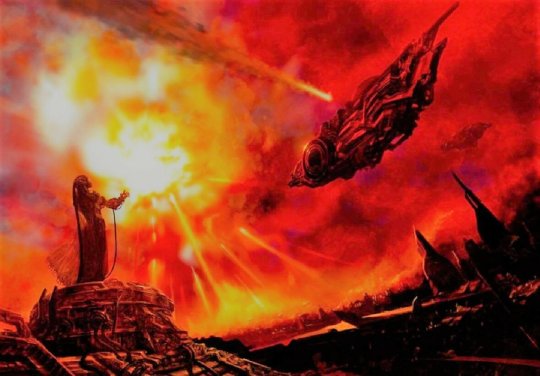
And what happened in the end? According to the ancient texts, after the completion of the bombing, the whole planet was raining radioactive rain for three days and three nights. This event is mentioned by almost all the peoples of the world, including in the legends of the Maya, the people of the Far North and the Australian Aborigines. And a little later, the Great Flood happened. The earth, as best it could, washes away traces of radiation contamination.
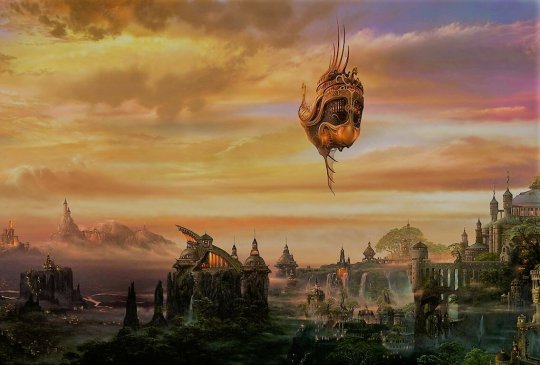
It is possible to treat this kind of information in different ways, but there are definitely all the prerequisites for the fact that the Earth was already once subjected to the destructive effects of nuclear weapons.
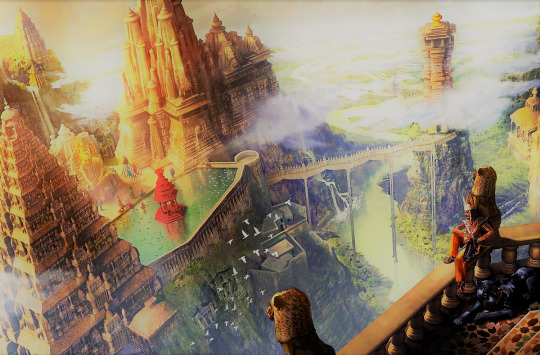
And it seems that it is no longer so important who and with whom then fought, given that at present we do not see either Asuras, or Reptilians, or Atlanteans with Lemurians on the streets of our cities. Apparently, in the end, it is impossible to win a nuclear war. Read the full article
3 notes
·
View notes
Text
Le Rig Veda et les origines des premières cités de la vallée de l'Indus-Sarasvatî.
À l’intersection de la légende, de la mythologie et de l’archéologie se trouve un texte ancien : le Rig Veda, l’un des plus vieux textes sacrés de l’humanité. Mais que nous raconte-t-il réellement des origines des premières cités de la vallée de l’Indus et de la Sarasvatî, cette mystérieuse civilisation des 7 rivières, dont les premières villes ont émergé autour de 3500 BCE ?La version…
#civilisation des sept rivières#harappa#invasion aryenne#Mohenjo-daro#rig veda#Sanskrit#sarasvati#vallée de l’Indus
0 notes
Text
youtube
One of the great cities of the Bronze Age Indus River Valley Civilization also called the Harappan Civilization. I talk about what we know, what we don't know and what we've uncovered. As well as touching on the eternal battle to protect and preserve the site for future generations of humanity.
#youtube#history#bronze age#archaeology#indian history#Indus River Valley Civilization#harappan civilization#Mohenjo-Daro#lost city
0 notes
Text
Time Travel Question 62: early Modern and Much Earlier
These Questions are the result of suggestions from the previous iteration.
This category may include suggestions made too late to fall into the correct grouping.
Please add new suggestions below if you have them for future consideration.
I can't remember if we did this one. It would have been late last summer. i think we did some specific species, but i can't remember if it was done in total. I am quoting the whole suggestion here: "Carboniferous forests, before Angiosperms became dominant. I want to see the lepidodendrons and the huge equisetes and all the many Araucaria and gnetophytes and ginkgos that once thrived."
It is too late to fix the typo, but the First item should read somemething like: "People, species, and landscapes of California circa 1400.
#Time Travel#California History#Indigenous history#California Indigenous People#Pre-Colonization Americas#Pre-Colonization Ecosystems#Food Forests#North American History#Mayan#History of Religion#Mesoamerican History#Carboniferous forests#lepidodendrons#equisetes#Araucaria#gnetophytes#ginkgos#Astronomy#Prehistory#Mohenjo Daro#History of India#Early Civilizations#Ancient World#Gobeklitepe#Catalhoyuk#Türkiye History#West Asian History#Babylon#History of Food#Jewish History
53 notes
·
View notes
Text
I'm just gonna say it.
It is okay if IVC had an entirely separate religion, or lack, thereof. Please do not view this civilization with a predisposition or from the lens of an already-existing religion. Be more open-minded.
#indus valley#indian history#harappan civilization#mohenjo daro#harappa#ancient civilizations#ancient city#ancient history#ancient culture#ancient#desiblr#desi tumblr#desi tag#desiposting#desi side of tumblr
55 notes
·
View notes
Text


"The Lord of Animals", Pashupati Seal, from the city of Mohenjo Daro, Indus Valley Civilisation
vs
Hyrule's Horse God Malanya
#legend of zelda#zelda#breath of the wild#malanya#horse god#indus valley#mohenjo daro#shiva#hyrule#lord of animals#hinduism#archaeology#history of religion#mythology
18 notes
·
View notes
Text


they should sell replicas of this guy in every store in every place in the world forever
2 notes
·
View notes
Text

A street at the ancient city of Harappa in Pakistan. 2500-2000 BCE, Indus Valley Civilisation.
5 notes
·
View notes
Text
A 4500-year-old statue of a dancing girl from what was the then-major city of Mohenjo-Daro, in what is now Pakistan.

2 notes
·
View notes
Text
missing the mesopotamian civilization augh
4 notes
·
View notes
Text
The Rig Veda and the origins of the first cities of the Indus-Sarasvati valley.
At the intersection of legend, mythology and archaeology lies an ancient text: the Rig Veda, one of humanity’s oldest sacred texts. But what does it really tell us about the origins of the first cities of the Indus Valley and Sarasvati, this mysterious civilization of the 7 rivers, whose first cities emerged around 3500 BCE? The “official” version – or at least the one that remains widely…
#Aryan Invasion#harappa#Indus valley#Mohenjo-daro#rig veda#Sanskrit#sarasvati#Seven Rivers Civilization
0 notes
Video
youtube
মহেঞ্জোদারো সভ্যতার ইতিহাস | mohenjo daro history
মহেঞ্জোদারো সভ্যতার ইতিহাস | mohenjo daro history
"বিলুপ্ত সভ্যতা: মহেঞ্জো দারোর গোপন ইতিহাস" – এই ভিডিওতে আমরা আপনাকে নিয়ে যাবো প্রাচীন বিশ্বের এক বিস্ময়কর রহস্যময় শহর মহেঞ্জো দারোর গভীরে। প্রায় পাঁচ হাজার বছর আগে সিন্ধু নদীর তীরে গড়ে উঠেছিল এই মহানগরী, যেখানে ছিল আধুনিক নগর পরিকল্পনা, উন্নত স্নানাগার ও সুসংগঠিত ড্রেনেজ ব্যবস্থা। কীভাবে একটি সমৃদ্ধ নগরী এতো পরিকল্পিত ছিল? কী রহস্য লুকিয়ে আছে এর নির্মাণ শৈলীতে?
ভিডিওর বিশেষ আকর্ষণ:
মহেঞ্জো দারোর আবিষ্কার - কীভাবে এই শহরটি আমাদের সামনে উন্মোচিত হলো, প্রত্নতাত্ত্বিক রাখালদাস বন্দ্যোপাধ্যায়ের চোখে। শহরের উন্নত পরিকল্পনা - মহেঞ্জো দারোর নিখুঁত নগর বিন্যাস, রাস্তা ও গলির বিশেষ বৈশিষ্ট্য যা আজকের আধুনিক শহরের সাথেও তুলনীয়। রহস্যময় নিদর্শন - প্রাচীন মূর্তি, ভাষা ও লিপির রহস্যময় সংকেত যা এখনো সম্পূর্ণরূপে উদঘাটিত হয়নি।
অপ্রকাশিত ইতিহাসের টুকরো - কীভাবে একটি সুসংগঠিত সমাজের পতন ঘটলো? কী সত্যিই এটি কোন প্রাকৃতিক দুর্যোগের ফল ছিল, নাকি কোনো মানবিক বিপর্যয়? এই ভিডিওতে প্রতিটি অংশে নতুন রহস্য, নতুন তথ্য এবং ধাপে ধাপে বিস্ময়ের ভান্ডার রয়েছে যা আপনাকে পুরো ভিডিওটি দেখতে বাধ্য করবে। আপনি জানতে পারবেন মহেঞ্জো দারোর প্রতিটি ছোট্ট ছোট্ট ঘটনা, যা এতোদিন আমাদের চোখের আড়ালে ছিল।
ভিডিওটি উপভোগ করতে ভুলবেন না! সাবস্ক্রাইব করুন আমাদের চ্যানেল এবং শেয়ার করুন ��ই রহস্যময় কাহিনীটি আপনার বন্ধুদের সাথে, যাতে তারাও এই অবিস্মরণীয় রহস্যের সাথে পরিচিত হতে পারে।
মহেঞ্জো দারো প্রাচীন সভ্যতা সিন্ধু সভ্যতা বিলুপ্ত সভ্যতা প্রাচীন ইতিহাস মহেঞ্জো দারোর রহস্য প্রাচীন পৃথিবী রহস্যময় শহর সিন্ধু নদীর সভ্যতা প্রত্নতত্ত্ব অজানা ইতিহাস প্রাচীন শহর বাংলা ইতিহাস বিস্ময়কর তথ্য রহস্যময় কাহিনী প্রাচীন কালের নগরী
0 notes
Text
Pooja Hegde's Inspiring Bollywood Journey: A Testament to Perseverance and Talent

In the resplendent galaxy of Indian cinema, every star has a unique story. Pooja Hegde is one such star whose journey in Bollywood has been nothing short of extraordinary.
Pooja Hegde's cinematic expedition began in 2016 when she made her grand Bollywood debut with Ashutosh Gowariker's "Mohenjo Daro". Alongside the suave and experienced Hrithik Roshan, Pooja held her own remarkably well, demonstrating her vibrant acting skills through her portrayal of Chaani, the High Priest's daughter.
The film might not have been a commercial hit, but it paved the way for her future career moves. It was her proverbial foot in the door of the Hindi film industry, and the promising actress did not look back from there.
Her next Bollywood venture came in the form of a romantic comedy, Housefull 4, in 2019. A multi-starrer flick directed by Farhad Samji, the film gave her an opportunity to perform in a different genre, proving that she isn't just a one-note actress. This time, her performance was noticed and appreciated, critically and commercially.
In 2020, Pooja shared screen space with some big names in Bollywood once again in a romantic drama, "Ala Vaikunthapurramuloo". Pooja's chemistry with her co-star and her fascinating portrayal of sophisticated elegance worked magic on the screen.
Throughout her Bollywood journey, Hegde showcased her potential to mould into diverse roles, from historical drama to contemporary romance. It was not just her beauty but her talent and versatility that kept audiences enthralled.
The journey of Pooja Hegde is symbolic of her dedication, perseverance, and passion. Despite not having a quintessential 'blockbuster' start, her commitment to her craft and her resilience has led her to become one of the most sought-after actresses in Bollywood.
Pooja Hegde's Bollywood journey continues to be an inspiring one. From her debut film in Mohenjo Daro to her most recent roles, she has constantly evolved and proven her mettle. Here's to the promising actress that is Pooja Hegde and the beautiful journey she is undertaking through Bollywood.
1 note
·
View note